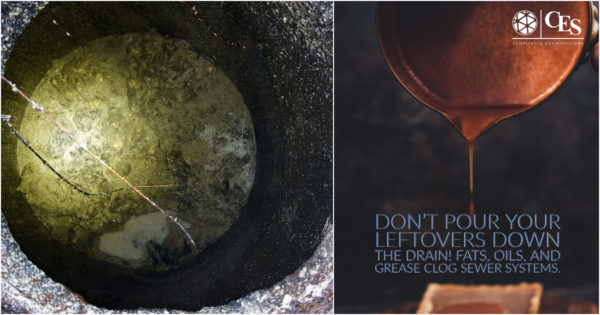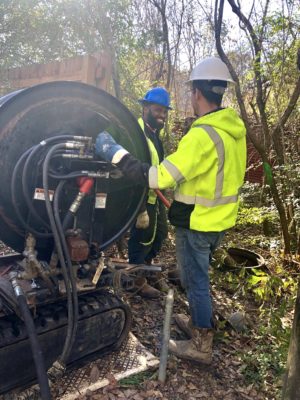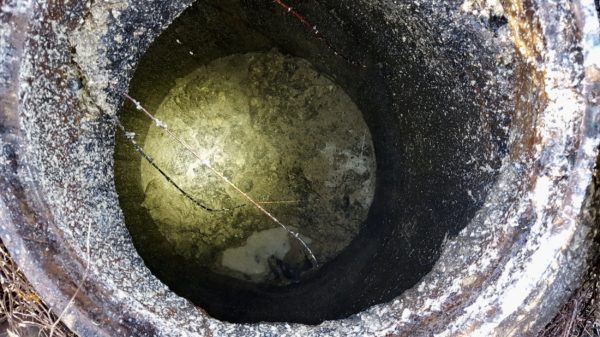PSA from CES: Always can and toss grease, especially this holiday season
Can the grease – Don’t pour it down the drain this holiday season or EVER
 Gravy, bacon fat, salad dressing, and greasy turkey drippings make for a successful holiday meal but can be a recipe for disaster for public works.
Gravy, bacon fat, salad dressing, and greasy turkey drippings make for a successful holiday meal but can be a recipe for disaster for public works.
Most of us have been told not to pour grease down the drain, yet most of us are guilty of getting rid of food scraps (which often contains FOG – fats, oil, and grease) by rinsing it off dishes into the kitchen sink – thinking it’s practical and harmless. That is what the garbage disposal is for, right? Wrong.
The problem with rinsing or flushing grease down any drain is that once cooled, it solidifies and creates clogs, leading to huge problems like wastewater backing up into homes or businesses or overflowing from manholes into yards, streets, and storm drains.
It’s not just bacon grease that you should can and toss. We are talking food scraps, cooking oil, shortening, lard, butter, margarine, gravy, mayonnaise, salad dressings, and sour cream. It doesn’t stop there. Fibrous foods, such as celery, asparagus, artichokes, chard, kale, lettuce, potato peelings, and onion skins should all be kept out of your garbage disposal unit. Additionally, pasta and rice, coffee grounds, fruit pits, seeds, and apple cores, eggshells, and bones, should not go down the kitchen sink, according to HomeInstructions.com.
So, what can the garbage disposal and our pipes handle? Liquids and soft food (and even then, soft food should be chopped up thoroughly before feeding to your disposal unit). To be safe, we recommend tossing all leftovers into a garbage can or compost to help keep our sewer systems healthy.
CES knows first-hand the impacts of hardened grease in pipes, including the smells.
“Grease, unfortunately, is one of the most common reasons for sewer back-ups in Baton Rouge,” says CES Project Manager, Marc Fogos.
Fogos explains that grease not only creates blockages in sewer pipes, but it can also cause the pumps in the pump stations to clog causing the whole system to back-up. When the system backs up, it causes back-ups in homes and sewer manholes. Sanitary sewer overflows (SSOs) allow raw sewage to enter our freshwater lakes, rivers, creeks, streams, and other waterways.
“Most people don’t realize that when they are fishing in canals here in Baton Rouge, the canals are contaminated with sewer. Therefore, the fish they are eating out of the canals are contaminated as well. This is partly caused by the backup related issues from grease in the sewer,” says Fogos.

Bobby Stafford Jr. (left) and Kristof Ludwig of Compliance EnviroSystems use an easement machine running off a Vac-Con truck to clean a sewer line clogged with grease in Baton Rouge, Louisiana.
The cleaning process to remove grease is very intensive. When FOG builds up over time it hardens and sticks to the pipe. The longer it is in the pipe, the harder it becomes. It also accumulates over time and eventually creates blockages which we now know affects homes and businesses.
Grease in sewer systems can cause expensive repairs year-round but can be especially harmful this time of year when everyone is preparing big meals. Restaurants, as well as homeowners, must scrape off the dishes and utensils before washing. Help protect your city’s infrastructure by educating your family and friends on the importance of keeping FOG — fats, oils, and grease — out of the sewer system.
